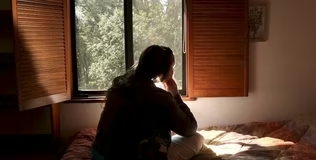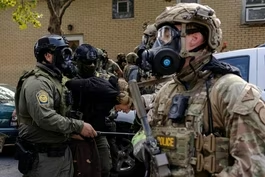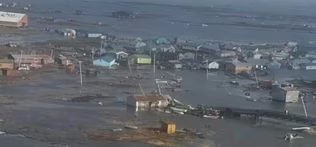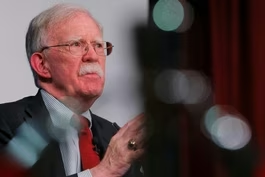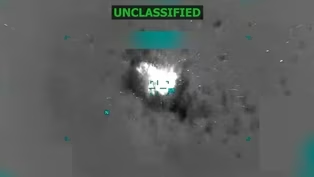
How Israelis are working to process the trauma of Oct. 7
Clip: 10/16/2025 | 8mVideo has Closed Captions
How Israelis are working to process the collective trauma of the Oct. 7 attacks
The wounds of war are not just physical. They can be as severe mentally as any gunshot or explosive scarring. The levels of trauma across Israel following Oct. 7 have plunged it into a mental health crisis. With a shortage of mental health professionals, Israel’s leading hospital has begun conducting trials using AI to diagnose patients. With producer Karl Bostic, Leila Molana-Allen reports.
Problems playing video? | Closed Captioning Feedback
Problems playing video? | Closed Captioning Feedback
Major corporate funding for the PBS News Hour is provided by BDO, BNSF, Consumer Cellular, American Cruise Lines, and Raymond James. Funding for the PBS NewsHour Weekend is provided by...

How Israelis are working to process the trauma of Oct. 7
Clip: 10/16/2025 | 8mVideo has Closed Captions
The wounds of war are not just physical. They can be as severe mentally as any gunshot or explosive scarring. The levels of trauma across Israel following Oct. 7 have plunged it into a mental health crisis. With a shortage of mental health professionals, Israel’s leading hospital has begun conducting trials using AI to diagnose patients. With producer Karl Bostic, Leila Molana-Allen reports.
Problems playing video? | Closed Captioning Feedback
How to Watch PBS News Hour
PBS News Hour is available to stream on pbs.org and the free PBS App, available on iPhone, Apple TV, Android TV, Android smartphones, Amazon Fire TV, Amazon Fire Tablet, Roku, Samsung Smart TV, and Vizio.
Providing Support for PBS.org
Learn Moreabout PBS online sponsorshipAMNA NAWAZ: The wounds of war are not just physical.
The mental scars can be devastatingly potent and are dangerously invisible.
Leila Molana-Allen reports tonight from Southern Israel on how, for many Israelis, the trauma of the October 7 Hamas attacks is never far away.
LEILA MOLANA-ALLEN: Meet LIV, your new psychotherapist.
A.I.
COMPUTER VOICE: Hello, everyone.
I'm LIV, a compassionate A.I.
designed to assist in psychiatric interviews.
LEILA MOLANA-ALLEN: LIV came into being from a pressing need.
The levels of trauma across Israel following the horrors of October 7 have plunged the state into a mental health crisis.
The levels of trauma are so high and the demand for treatment so great that there's a shortage of mental health professionals.
So Israel's leading hospital, Sheba, one of the top 10 in the world, has begun conducting trials using A.I.
to diagnose patients.
WOMAN: And just like a real psychiatrist, she will look for the triggers that are brought me here.
Every time there is deterioration or emergency in the country, I just find myself spiraling again, and sometimes I feel it's just too much.
A.I.
COMPUTER VOICE: It sounds like the ongoing situation is having a significant impact on your well-being.
When did you first notice these feelings intensifying since the war began?
LEILA MOLANA-ALLEN: But there are some voids that technology can never fill.
Those whose lives changed forever are now scattered across the country, but some are going back to the places where they were attacked, hoping to heal physical scars alongside emotional ones.
Most of the residents of Nir Oz, a kibbutz just four miles from Gaza, have been living far away outside Tel Aviv.
But to celebrate Rosh Hashanah, the Jewish new year, nearly 300 residents came home out of defiance and solidarity.
Gadi Moses was taken hostage and released in February after being held captive in the tunnels of Gaza for 482 days.
Now he's moving back to Nir Oz.
GADI MOSES, Released Hostage: My commitment, my job is to rebuild the place with different people, so the people on the other side of the border will understand we are here forever.
LEILA MOLANA-ALLEN: Tiny Nir Oz was the border area the hardest hit on October 7.
A quarter of its residents were killed and kidnapped and nearly three-quarters of the kibbutz was completely destroyed.
Now they're trying to rebuild their homes and this community, but recovery comes with its own challenges.
Rita Lifschitz has taken care to water not just her own garden, but those of her evacuated neighbors, trying to bring life and beauty back to what was once an agricultural paradise.
But moving on means letting go.
It's easier said than done.
RITA LIFSCHITZ, Daughter-in-Law of Oded and Yocheved Lifschitz: This is Shifra Noy's (ph) house, my friend's house, that she was murdered and her whole house was burned.
But I used to go in there and feel her.
So, when her house was taken away, I felt a bit of emptiness.
LEILA MOLANA-ALLEN: Because you could come here and remember her, and now they have cleared it, there's nothing left?
RITA LIFSCHITZ: Yes.
Yes.
Yes.
Yes.
LEILA MOLANA-ALLEN: Rita's mother-in-law, Yocheved, was kidnapped, but released by Hamas after 17 days due to her age and health.
But her husband 84-year-old Oded, was murdered in captivity.
They received his body for burial, but Yocheved is struggling to come to terms with his loss.
Rita hopes now that the rest of Nir Oz's living hostages have come home, Yocheved's constant nightmares will end.
RITA LIFSCHITZ: She can heal, start to heal now because all the live ones are not in the tunnels anymore.
She will not wake up in the tunnels in the morning.
LEILA MOLANA-ALLEN: With the return of the kibbutz's lost sons, a chance to remove all traces of the attack from their home and move forward.
But Rita knows not everyone can face coming back.
RITA LIFSCHITZ: You can feel that the community is split up, and this is breaking my heart.
You know, it will take a lot of power to bring all of us to be together, because some people will not come back here.
They have too much trauma.
LEILA MOLANA-ALLEN: Alon and Donna (ph), a part of a generation of young Israelis, determined to find a way to channel their own trauma from the attacks into something positive.
They're from Central Israel.
But along with dozens of other young couples, they're moving to Nir Oz.
ALON RATZON, New Nir Oz Resident: Now Israelis, when they hear the name Nir Oz, they have like a -- it's like a punch.
LEILA MOLANA-ALLEN: Next year, they plan to marry here in the open fields.
And helping this community heals them too.
ALON RATZON: Our effort to try to move on, to live powerfully is for sure helping us to deal with everything we're going through.
LEILA MOLANA-ALLEN: Rita only survived because she was lucky to be visiting Tel Aviv that day.
She had to watch her home being burned down on television, listen to the screams of her loved ones over the phone as she desperately tried to help them from afar.
Every day, while Oded was in captivity, she would sit in his fields and raise a beer to him, with another waiting for him beside her.
RITA LIFSCHITZ: He was the biggest fighter for peace.
He was a true friend to the Palestinian people.
I was sure I would see him come through the fields with a big smile saying: "My Arabic is perfect, I got great coffee, and I came home with a peace plan."
And he's up there now and watching this peace plan that is going to happen.
LEILA MOLANA-ALLEN: When his death was confirmed, in her desperate grief, she made a promise.
RITA LIFSCHITZ: And my peace fight will go even stronger to help grandpa Oded, my father-in-law, that this is going to happen, that our children here and the Palestinian children, the new generation will live in peace in the future and the borders will be open.
LEILA MOLANA-ALLEN: But not everyone has been able to find the right coping mechanisms.
Many have trauma, not because they were directly harmed that day, but because they now spend every day believing it could happen again at home, driving to school, at a party.
Memorials to the dead like this one dot Israel's south; 16-year-old Shahar Shlafrok has become a shadow of herself, each day more difficult to endure.
She struggles to concentrate or to sleep.
SHAHAR SHLAFROK, Israeli Student: I live right here to wake up every morning to the sound of the war and to wake up every night, even though I have school tomorrow.
This -- that my hand is shaking.
And I have nothing to do with that, because this is how my body reacts.
And even though I'm getting used to it, I have to face it.
I'm still a student in school, I'm 11th grade.
And I have to wake up every night because my bed is moving and try to focus, because I have friends and family that are murdered here in the kibbutz.
So we also escaped.
And I saw a lot of things.
LEILA MOLANA-ALLEN: Seeking solace where they can, every soul in this traumatized nation knows they are united in their grief, but the road to personal healing is one each must walk alone.
For the "PBS News Hour," I'm Leila Molana-Allen in Southern Israel.
Abortion bans fueling rise in domestic violence, experts say
Video has Closed Captions
Clip: 10/16/2025 | 8m 54s | Abortion restrictions may be fueling a rise in domestic violence, experts warn (8m 54s)
News Wrap: Judge says ICE must wear body cameras in Chicago
Video has Closed Captions
Clip: 10/16/2025 | 6m 17s | News Wrap: Judge says immigration officers operating in Chicago must wear body cameras (6m 17s)
Rescue crews airlift hundreds out of rural Alaskan villages
Video has Closed Captions
Clip: 10/16/2025 | 7m 3s | Rescue crews airlift hundreds out of rural Alaskan villages after powerful storm (7m 3s)
Trump adviser turned critic John Bolton indicted
Video has Closed Captions
Clip: 10/16/2025 | 5m 41s | Trump adviser turned critic John Bolton indicted over handling of classified documents (5m 41s)
Trump weighs Venezuela land strikes following boat attacks
Video has Closed Captions
Clip: 10/16/2025 | 10m 20s | Trump weighs land strikes in Venezuela following attacks on suspected drug boats (10m 20s)
Young Republicans' hateful group chat sparks condemnation
Video has Closed Captions
Clip: 10/16/2025 | 5m 26s | Young Republicans' hateful group chat sparks bipartisan condemnation (5m 26s)
Providing Support for PBS.org
Learn Moreabout PBS online sponsorship
- News and Public Affairs

FRONTLINE is investigative journalism that questions, explains and changes our world.

- News and Public Affairs

Amanpour and Company features conversations with leaders and decision makers.












Support for PBS provided by:
Major corporate funding for the PBS News Hour is provided by BDO, BNSF, Consumer Cellular, American Cruise Lines, and Raymond James. Funding for the PBS NewsHour Weekend is provided by...
